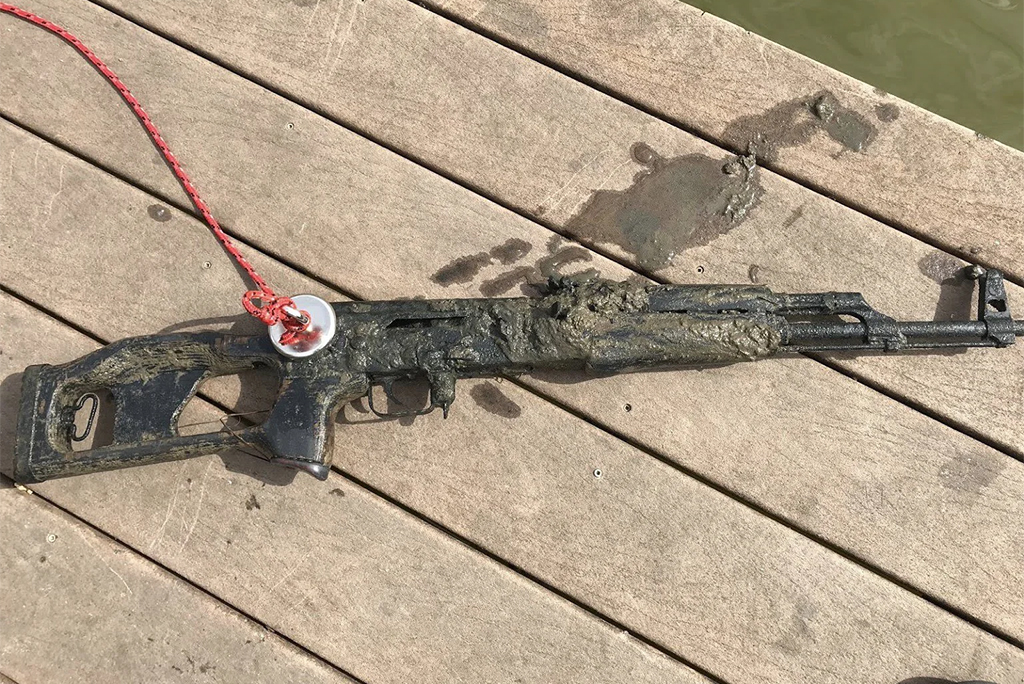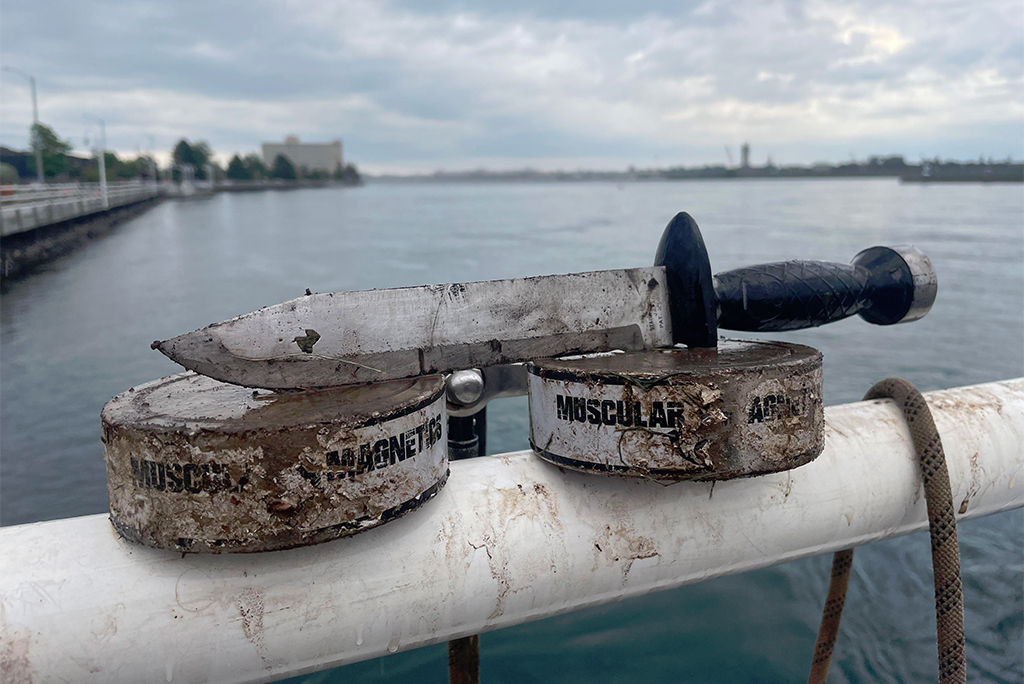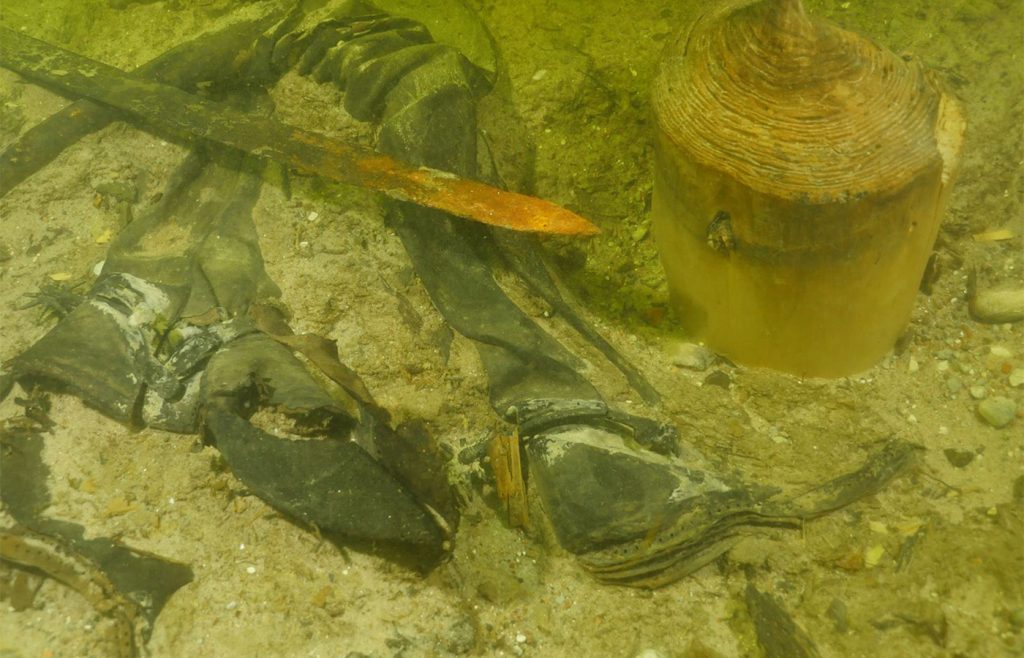Magnet fishing has been growing in popularity in the United States over the past few years, with many enthusiasts enjoying the thrill of discovering long-forgotten treasures beneath the water’s surface. However, it is important for magnet fishers to be aware of the laws and regulations that govern this hobby. In this article, we will explore the laws surrounding magnet fishing in the United States, and provide guidance on how to handle certain items that may be found during the activity.
Table of Contents
Finding Guns Magnet Fishing
One of the most thrilling aspects of magnet fishing is uncovering hidden treasures from beneath the water’s surface. However, if you happen to come across a firearm while magnet fishing, it is important to remember that these items require special attention and care.
First and foremost, it is crucial to prioritize safety above all else. Guns can be incredibly dangerous, and attempting to remove one from the water can lead to serious injury or even death. If you come across a firearm while magnet fishing, do not touch it or attempt to retrieve it from the water yourself. Instead, contact your local law enforcement agency immediately and report your discovery. They will have the necessary training and equipment to safely retrieve and dispose of the firearm.
It is also important to remember that firearms are subject to strict regulation and laws in the United States. Each state may have different regulations regarding the possession, transportation, and sale of firearms, and it is essential to familiarize yourself with these laws before attempting to remove a firearm from the water.
In addition, it is important to note that even if a firearm appears to be inoperable or damaged, it may still be considered a dangerous weapon under the law. In many cases, it is illegal to possess or transport any firearm without the proper permits and licensing, regardless of its condition.
In some cases, local authorities may choose to investigate the discovery of a firearm during a magnet fishing expedition. If this occurs, it is important to cooperate fully with the authorities and provide any information or evidence that may be helpful to their investigation.

In conclusion, if you come across a firearm while magnet fishing, it is important to prioritize safety above all else. Do not attempt to retrieve the firearm yourself, and contact your local law enforcement agency immediately. Additionally, it is crucial to familiarize yourself with the regulations and laws regarding firearms in your state, and to cooperate fully with local authorities in the event of an investigation. By following these guidelines, you can enjoy the exciting hobby of magnet fishing while staying safe and respecting the laws that govern it.
Finding Knives Magnet Fishing
While not as dangerous as firearms, finding knives while magnet fishing still requires caution and care. Knives can be sharp and potentially harmful, so it is important to take the necessary steps to ensure safety when coming across them.
Similar to firearms, if you discover a knife while magnet fishing, it is important to avoid touching it and to contact your local law enforcement agency. Allow them to retrieve and dispose of the knife safely. Attempting to remove the knife from the water yourself can lead to serious injury, especially if the blade is sharp or the handle is corroded.
It is also important to note that some types of knives may be illegal to possess in certain states or localities. For example, switchblades or other automatic knives may be prohibited in certain areas, and carrying a knife with a blade longer than a certain length may also be against the law. Before you start magnet fishing, be sure to research the laws and regulations regarding knives in your area to avoid any potential legal issues.
In some cases, local authorities may choose to investigate the discovery of a knife during a magnet fishing expedition. If this occurs, it is important to cooperate fully with the authorities and provide any information or evidence that may be helpful to their investigation.
Finally, it is important to practice responsible environmental stewardship when magnet fishing for knives or any other items. Make sure to properly dispose of any trash or debris that you may come across, and avoid disturbing sensitive habitats or ecosystems.

In conclusion, finding knives while magnet fishing requires careful handling and adherence to local laws and regulations. Contact law enforcement if you come across a knife, and be sure to research the laws regarding knives in your area to avoid any potential legal issues. By following these guidelines, you can enjoy the exciting hobby of magnet fishing while staying safe and respecting the laws and environment around you.
Finding Bombs Magnet Fishing
While the likelihood of finding explosives while magnet fishing is low, it is still a possibility that should not be taken lightly. Explosive devices can be extremely dangerous, and it is crucial to take the appropriate actions if you come across one.
If you do discover a suspected explosive device while magnet fishing, the first thing you should do is not touch it or attempt to move it in any way. The slightest movement could trigger the device and result in serious injury or even death. Instead, immediately contact your local law enforcement agency and report the situation. Provide them with as much information as possible, including your location and a description of the object.
In the United States, the Federal Bureau of Investigation (FBI) has a Bomb Data Center that can provide assistance in situations involving suspected explosives. The center can help local law enforcement agencies identify the device and provide guidance on how to safely handle and dispose of it.
It is important to evacuate the area and ensure that no one else comes near the device until it has been safely disposed of by professionals. Depending on the size and type of device, the bomb squad may need to be called in to handle the situation. In any case, it is important to follow the instructions of law enforcement officials and to remain at a safe distance until the situation has been resolved.
It is also important to note that depending on the circumstances, local or federal laws may apply to the possession, handling, or transportation of explosive devices. These laws can vary by state and locality, so it is important to research the laws in your area to avoid any potential legal issues.

In conclusion, discovering explosives while magnet fishing is a rare but serious situation that requires immediate action. Do not touch the device or attempt to move it, and contact your local law enforcement agency immediately. Evacuate the area and follow the instructions of law enforcement officials until the situation has been resolved. Be aware of the laws in your area regarding explosive devices to avoid any potential legal issues. By following these guidelines, you can enjoy the hobby of magnet fishing while staying safe and respecting the laws and regulations in the United States.
Metal Detecting Law Similarities
Metal detecting has become a popular hobby in the United States, and many enthusiasts are interested in the laws and regulations that govern it. While metal detecting and magnet fishing are different activities, they share similarities in the legal restrictions that apply to them.
Like magnet fishing, metal detecting is subject to federal, state, and local laws. In the United States, metal detecting is generally allowed in public areas such as parks, beaches, and other recreational areas. However, there are certain restrictions that apply in specific locations, especially those that have historical or cultural significance.
For example, metal detecting is not allowed in many national parks and monuments, as these sites are protected by federal law. Metal detecting is also prohibited in some state parks, wildlife refuges, and historic sites. It is important to research the laws and regulations for metal detecting in your area before engaging in the activity.
In addition to federal and state laws, some local governments may also have their own regulations regarding metal detecting. These may include restrictions on the use of metal detectors in certain public areas or requirements for permits or licenses to use a metal detector.
It is also important to note that many metal detecting enthusiasts engage in the activity as a way to search for valuable artifacts or historical items. However, it is illegal to remove any artifacts or items from public lands without permission. If you find something of historical or archaeological significance while metal detecting, it is important to report it to the proper authorities.

Overall, while metal detecting laws and regulations may vary depending on the location, it is important to follow them to avoid any legal issues. Additionally, respecting historical and cultural sites is essential to preserve them for future generations.
Wreck and Salvage Laws
Wreck and salvage laws are a crucial aspect of magnet fishing in the United States. These laws are designed to protect the cultural and historical significance of submerged wrecks, and to ensure that any items found within them are preserved and handled in an appropriate manner.
In the United States, the rules and regulations surrounding wreck and salvage laws can vary depending on the state and location. For instance, in some states, a permit is required to engage in any kind of salvage activity, while in others, the state may retain ownership of all shipwreck artifacts. In addition, federal laws such as the Abandoned Shipwreck Act of 1987 give the federal government control over certain shipwrecks that are deemed to be of national historical or cultural significance.
It is important for magnet fishers to be aware of these laws and regulations in order to avoid any legal trouble or negative consequences. Failure to adhere to wreck and salvage laws can result in fines, criminal charges, and even imprisonment. In addition, removing items from a submerged wreck can damage the artifact and destroy important historical and cultural information that it may contain.

To avoid any potential legal issues, it is advisable for magnet fishers to obtain the necessary permits and licenses before engaging in any salvage activities. In addition, it is important to consult with local authorities and experts in the field to ensure that you are following all relevant laws and regulations. By doing so, you can help to preserve the historical and cultural significance of submerged wrecks while enjoying the unique hobby of magnet fishing.
Check Your State Regulations
Magnet fishing has grown in popularity in recent years, and many states in the United States have taken notice and established regulations to govern this activity. These regulations can vary widely from state to state, with some states being more restrictive than others. As such, it is crucial that anyone interested in magnet fishing familiarizes themselves with the laws in their respective states before heading out.
For example, some states may prohibit magnet fishing altogether, while others may allow it only in certain areas or with certain restrictions. For instance, in New York, magnet fishing is prohibited in certain areas, including near dams, locks, and other critical infrastructure. In Massachusetts, anyone over the age of 15 must have a valid freshwater fishing license to magnet fish, and the use of magnets with a pulling force greater than 100 pounds is not permitted.
Additionally, some states may require permits or licenses for certain types of magnet fishing. For instance, in California, a permit may be required for magnet fishing in state parks or other public lands. In Tennessee, a commercial license may be required for magnet fishing if the person is selling any of the items they recover.
It is also important to note that some states may have specific regulations regarding the types of magnets that can be used. In some cases, certain types of magnets may be prohibited or restricted in certain areas. It is important to research the laws and regulations in your state to ensure that you are using the appropriate equipment and following all necessary guidelines.

In summary, before embarking on a magnet fishing excursion, it is important to do your research and familiarize yourself with the laws and regulations in your state. By doing so, you can ensure that you are engaging in the activity safely and legally.
Check City / Local Ordinances
While state laws are important to consider when engaging in magnet fishing, it is equally important to research any local city laws that may apply to the activity. Local laws can vary widely depending on the region, and may impose additional regulations or restrictions beyond what is required by state law.
For example, some cities may prohibit magnet fishing in certain areas altogether, while others may have specific regulations regarding the types of magnets that can be used. Some cities may also require permits or licenses for certain types of magnet fishing, or may restrict the activity to certain times of day or specific areas.
To avoid any potential legal issues, it is important to thoroughly research the local laws in your area before engaging in magnet fishing. This can typically be done by checking with the city or county government, or by contacting the local law enforcement agency.

In some cases, local city laws may be more restrictive than state laws, so it is important to be aware of all applicable regulations. By taking the time to research and understand the local laws, you can ensure that you are engaging in magnet fishing safely and legally.
In conclusion, magnet fishing can be a fun and rewarding hobby, but it is important to be aware of the laws and regulations that govern it. By following the guidelines outlined in this article and doing your own research on state and local laws, you can enjoy magnet fishing safely and responsibly. Remember, it is always better to err on the side of caution when it comes to handling potentially dangerous items such as firearms or explosives. Always contact law enforcement if you find anything that you are unsure of, and never attempt to remove or handle these items yourself.
Additionally, it is important to practice responsible environmental stewardship while magnet fishing. Make sure to properly dispose of any trash or debris that you may come across, and avoid disturbing sensitive habitats or ecosystems.
Finally, remember that magnet fishing is a hobby that requires patience, perseverance, and a keen eye for detail. While it may take some time and effort to uncover hidden treasures beneath the water’s surface, the rewards of this hobby can be well worth the investment.
In conclusion, magnet fishing is a fun and exciting hobby that has gained popularity in recent years. However, it is important for magnet fishers to be aware of the laws and regulations that govern this activity, as well as how to handle certain items that may be found during searches. By following the guidelines outlined in this article, magnet fishers can enjoy the hobby safely and responsibly while respecting the environment and the laws that govern it.

